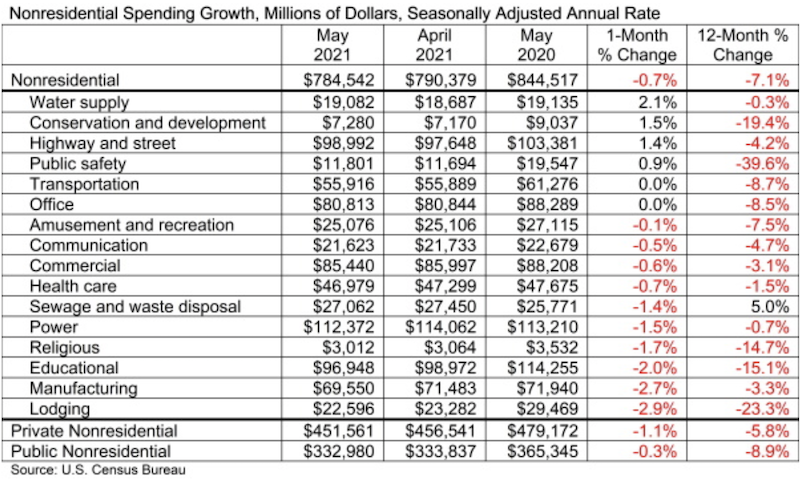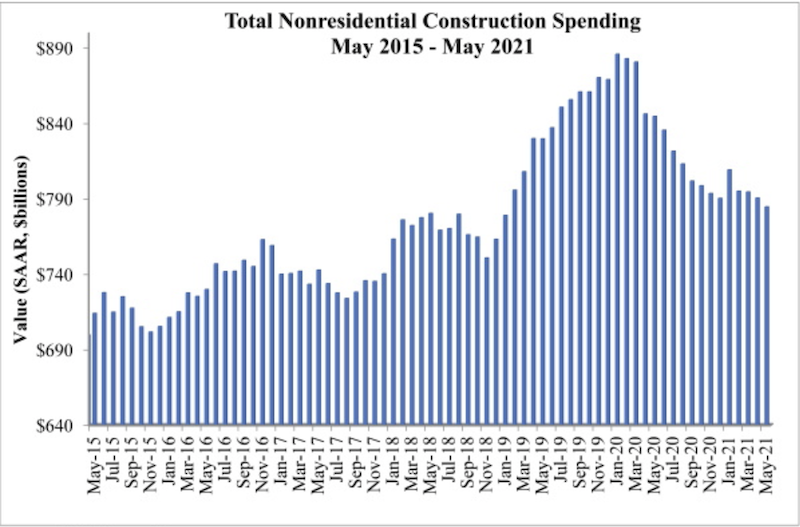In its first-quarter index of Construction Confidence, the Associated Builders and Contractors (ABC) found that 55% of contractors expected their sales to increase over the following six months, and only 19% thought their sales would decline in that period.
They might need to recalibrate their exuberance, in light of the trade group’s latest analysis of data published by the U.S. Census Bureau, which ABC released today. It estimates that national nonresidential construction spending in May, at $784.5 billion, was down 7.1% from the same month a year ago, and off 0.7% from spending levels in April 2021.
On a year-over-year basis, spending for every nonresidential category that ABC tracks, except sewage and waste disposal, was negative. Spending on public safety projects—which surged during the early months of the pandemic—showed the greatest decline in May, 39.6%, and lodging also took a big hit (off 23.3% to $22.6 billion). On the other hand, spending in May on healthcare construction, nearly $47 billion, was down only marginally, by 1.5%, compared to the same month a year ago.
WORKER SHORTAGES AND MATERIAL PRICING REMAIN PROJECT ROADBLOCKS

Construction spending for public safety and lodging projects showed the steepest declines in May compared to the same month a year ago.
A red-hot data center market hasn’t spelled more office construction, notes Anirban Basu, ABC’s Chief Economist. Basu also points out that while some private construction segments are struggling under the dislocating impacts of the pandemic, public nonresidential construction actually has declined more rapidly than the private sector over the past year.
Basu sees some hope for the future. Public construction spending should benefit from improvements in state and local governments’ financial conditions. But he tempers his predictions because of still-high construction materials prices and “deeply problematic” worker shortages. Basu expressed some concern, too, about the disproportionate amount of spending moving toward residential construction, which accounted for 41% of the pre-pandemic total and 49% in May.
Related Stories
Cultural Facilities | Aug 21, 2024
Baltimore’s National Aquarium opens 10,000-sf floating wetland that mimics the harbor’s original tidal marsh habitat
The National Aquarium in Baltimore has opened the National Aquarium Harbor Wetland, a 10,000-sf floating wetland that mimics the Inner Harbor’s original Chesapeake Bay tidal marsh habitat. Located between Piers 3 and 4 on Baltimore’s Inner Harbor, the $14 million project features more than 32,000 native shrubs and marsh grasses.
Mixed-Use | Aug 21, 2024
Adaptive reuse of a Sears store becomes luxury mixed-use housing
6 Corners Lofts at 4714 W Irving Park Road, Chicago, Ill., opened in March of 2024 as a 394,000-sf adaptive reuse project born out of a former Sears store.
Building Materials | Aug 19, 2024
Federal 'buy clean' construction materials label program unveiled
The U.S. Environmental Protection Agency announced a plan for implementing a new label program to boost American production of more climate-friendly construction materials and products. The label program will prioritize steel, glass, asphalt and concrete.
Museums | Aug 19, 2024
The Tampa Museum of Art will soon undergo a $110 million expansion
In Tampa, Fla., the Tampa Museum of Art will soon undergo a 77,904-sf Centennial Expansion project. The museum plans to reach its $110 million fundraising goal by late 2024 or early 2025 and then break ground. Designed by Weiss/Manfredi, and with construction manager The Beck Group, the expansion will redefine the museum’s surrounding site.
Reconstruction & Renovation | Aug 19, 2024
Movement to protect historic buildings raises sharp criticism
While the movement to preserve historic buildings has widespread support, it also has some sharp critics with well-funded opposition groups springing up in recent years. Some opponents are linked to the Stand Together Foundation, founded and bankrolled by the Koch family’s conservative philanthropic organization, according to a column in Governing magazine.
Government Buildings | Aug 19, 2024
GSA posts new RFI for enabling energy efficiency, decarbonization in commercial buildings
The U.S. General Services Administration (GSA), in collaboration with the U.S. Department of Energy, recently released a new Request For Information (RFI) focused on enabling energy efficiency and decarbonization in commercial buildings. GSA wants to test innovative technologies through GSA’s Center for Emerging Building Technologies.
MFPRO+ New Projects | Aug 16, 2024
At 60 stories, the Paramount multifamily development will stand as Nashville’s tallest high rise
When complete, the 60-story Paramount building, at 750 feet high, will be the tallest high rise tower in Nashville, Tenn., surpassing the city’s current record holder, the 617-foot AT&T Building. The $390 million Paramount project recently launched condo sales after securing more than $230 million in construction financing.
Urban Planning | Aug 15, 2024
New York City begins first large-scale porous pavement installation
New York City is installing its first large-scale porous pavement installation along seven miles of roadway in Brooklyn. The project will keep 35 million gallons of stormwater out of the combined sewer system each year, according to a news release.
Curtain Wall | Aug 15, 2024
7 steps to investigating curtain wall leaks
It is common for significant curtain wall leakage to involve multiple variables. Therefore, a comprehensive multi-faceted investigation is required to determine the origin of leakage, according to building enclosure consultants Richard Aeck and John A. Rudisill with Rimkus.
MFPRO+ News | Aug 14, 2024
Report outlines how Atlanta can collaborate with private sector to spur more housing construction
A report by an Urban Land Institute’s Advisory Services panel, commissioned by the city’s housing authority, Atlanta Housing (AH), offered ways the city could collaborate with developers to spur more housing construction.

















